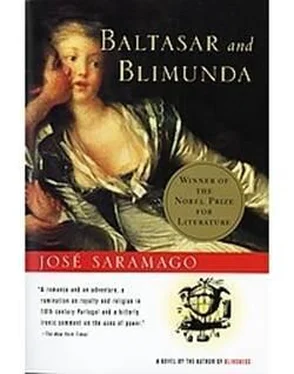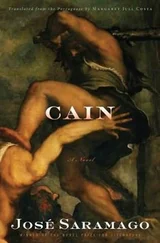José Saramago - Baltasar and Blimunda
Здесь есть возможность читать онлайн «José Saramago - Baltasar and Blimunda» весь текст электронной книги совершенно бесплатно (целиком полную версию без сокращений). В некоторых случаях можно слушать аудио, скачать через торрент в формате fb2 и присутствует краткое содержание. Жанр: Современная проза, на английском языке. Описание произведения, (предисловие) а так же отзывы посетителей доступны на портале библиотеки ЛибКат.
- Название:Baltasar and Blimunda
- Автор:
- Жанр:
- Год:неизвестен
- ISBN:нет данных
- Рейтинг книги:5 / 5. Голосов: 1
-
Избранное:Добавить в избранное
- Отзывы:
-
Ваша оценка:
- 100
- 1
- 2
- 3
- 4
- 5
Baltasar and Blimunda: краткое содержание, описание и аннотация
Предлагаем к чтению аннотацию, описание, краткое содержание или предисловие (зависит от того, что написал сам автор книги «Baltasar and Blimunda»). Если вы не нашли необходимую информацию о книге — напишите в комментариях, мы постараемся отыскать её.
Baltasar and Blimunda — читать онлайн бесплатно полную книгу (весь текст) целиком
Ниже представлен текст книги, разбитый по страницам. Система сохранения места последней прочитанной страницы, позволяет с удобством читать онлайн бесплатно книгу «Baltasar and Blimunda», без необходимости каждый раз заново искать на чём Вы остановились. Поставьте закладку, и сможете в любой момент перейти на страницу, на которой закончили чтение.
Интервал:
Закладка:
Queens are denied these opportunities of unburdening their souls, especially if they have been made pregnant and by their legitimate husband, who for nine months will no longer come near them, a rule widely accepted but sometimes broken. Dona Maria Ana has every reason to exercise discretion, given the strict piety with which she had been brought up in Austria and her wholehearted compliance with the friar's strategy, thus showing, or at least giving the impression, that the child being conceived in her womb is as much a daughter for the King of Portugal as for God Himself, in exchange for a convent.
Dona Maria Ana retires to her bedchamber at an early hour and says her prayers in singsong harmony with her ladies-in-waiting before getting into bed, and then, once settled underneath her eiderdown, she resumes her prayers, and prays on and on, while the ladies-in-waiting start to nod but fight their drowsiness like wise women, if not wise virgins, and finally withdraw, all that remains to watch over her is the light from the lamp, and the lady-in-waiting on duty, who spends the night on a low couch by the Queen's bed, will soon be asleep, free to dream if she so chooses, but what is being dreamed behind those eyelids is of no great importance, what interests us is the frightening thought still troubling Dona Maria Ana as she is about to fall asleep, that on Maundy Thursday she will have to go to the Church of the Mother of God, where the nuns will unveil the Holy Shroud in her presence before showing it to the faithful, a shroud that bears the clear impression of the Body of Christ, the one true Holy Shroud that exists in the Christian world, ladies and gentlemen, just as all the others are the one true Holy Shroud, or they would not all be shown at the same hour in so many different churches throughout the world, but because this one happens to be in Portugal it is the truest Holy Shroud of all and altogether unique. When still conscious, Dona Maria Ana imagines herself bending over the sacred cloth, but it is difficult to say whether or not she is about to kiss it with reverence, because suddenly she falls asleep and finds herself in a carriage that is taking her back to the Palace at dead of night with an escort of halberdiers, when unexpectedly a man appears on horseback, returning from the chase, accompanied by four servants mounted on mules, with furred and feathered creatures inside nets dangling from their pommels, the mysterious horseman races toward the carriage, his shotgun at the ready, the horse's hooves cause sparks to ignite on the cobbles, and smoke erupts from its nostrils, and when he charges like a thunderbolt through the Queen's guard and reaches the carriage steps, where he brings his mount to a halt with some difficulty, the flames of the torches illumine his face, it is the Infante Dom Francisco, from what land of dreams could he have come, and why should he appear time and time again. The horse is startled, no doubt because of the clattering of the carriage on the cobblestones, but when the Queen compares these dreams she observes that the Infante comes a little closer each time, What can he want, and what does she want.
For some Lent is a dream, for others a vigil. The Easter festivities passed and wives returned to the gloom of their apartments and their cumbersome petticoats, at home there are a few more cuckolds, who can be quite violent when infidelities are practised out of season. And since we are now on the subject of birds, it is time to listen in church to the canaries singing rapturously of love from their cages decorated with ribbons and flowers, while the friars preaching in the pulpits presume to speak of holier things. It is Ascension Thursday, and the singing of the birds soars to the vaults of heaven regardless of whether our prayers follow, without their assistance, our prayers have little hope of reaching God, so perhaps we shall all remain silent.
T HIS SCRUFFY-LOOKING FELLOW with his rattling sword and ill-assorted clothes, even though barefoot, has the air of a soldier, and his name is Baltasar Mateus, otherwise known as Sete-Sóis or Seven Suns. He was dismissed from the army where he was of no further use once his left hand was amputated at the wrist after being shattered by gunfire at Jerez de los Caballeros, in the ambitious campaign we fought last October with eleven thousand men, only to end with the loss of two hundred of our soldiers and the rout of the survivors, who were pursued by the Spanish cavalry dispatched from Badajoz. We withdrew to Olivença with the booty we had taken in Barcarrota, feeling much too down-hearted to enjoy it, gaining little by the ten leagues march there, and then making a rapid retreat over the same distance, only to leave behind on the battlefield so many casualties and the shattered hand of Baltasar Sete-Sóis. By great good fortune, or by the special grace of the scapular he was wearing around his neck, his wound did not become gangrenous, nor did they burst his veins with the force of the tourniquet applied to stop the bleeding, and thanks to the surgeon's skill, it was only a matter of disarticulating the man's tendons, without having to cut through the bone with a handsaw. The stump was treated with medicinal herbs, and Sete-Sóis had such healthy flesh that after two months the wound was completely healed.
Having saved little or nothing of his soldier's pay, Sete-Sóis begged for alms in Évora till he had enough money to pay the blacksmith and the saddler for an iron hook to replace his hand. This was how he spent the winter, putting aside half of the money he managed to collect, reserving half of the other half for the journey ahead, and spending the rest on food and wine. It was already spring by the time he had paid off the final instalment he owed the saddler and collected the iron hook, as well as a spike he had ordered, because Baltasar Sete-Sóis fancied the idea of having an alternative left hand. Crafted leather fittings were skilfully attached to the tempered irons, and there were two straps of different lengths to attach the implements to the elbow and shoulder for greater support. Sete-Sóis began his journey when it was rumoured that the garrison at Beira was to remain there instead of coming to the assistance of the troops in Alentejo, where there was an even greater shortage of food than in the other provinces. The army was in tatters, barefoot and reduced to rags, the soldiers pilfered from the farmers and refused to go on fighting, a considerable number went over to the enemy, while many others deserted, travelling off the beaten track, looting in order to eat, raping any women they encountered on the way, in short, taking their revenge on innocent people who owed them nothing and shared their despair. Sete-Sóis, maimed and bedraggled, travelled the main highway to Lisbon, deprived of his left hand, part of which had remained in Spain and part in Portugal, and all because of a strategic war to decide who was to occupy the Spanish throne, an Austrian Charles or a French Philip, but no one Portuguese, whether unimpaired or one-handed, intact or mutilated, unless to leave severed limbs or lost lives behind on the battlefield is not only the destiny of soldiers who have nothing but the ground to sit on. Sete-Sóis left Évora and passed through Montemor, accompanied by neither friar nor demon, for when it came to extending a begging hand, the one he possessed was sufficient.
Sete-Sóis went at his leisure. There was no one waiting to greet him in Lisbon, and in Mafra, which he had left many years ago to join His Majesty's Infantry, his father and mother, if they remember him, will think he is alive since no one has reported him dead or believe him to be dead because they have no proof he is still alive. All will be revealed in good time. The sun shines brightly and there has been no rain, the countryside is covered with flowers and the birds are singing. Sete-Sóis carries his irons in his knapsack, for there are moments, sometimes whole hours, when he imagines he can feel his hand, as if it were still there at the end of his arm, and it gives him enormous pleasure to imagine himself whole and entire just as Charles and Philip will sit whole and entire on their thrones, for thrones they will certainly have when the war is over. Sete-Sóis is content, so long as he does not look to find that his hand is missing, to feel an itching at the tip of his index finger and imagine that he is scratching the spot with his thumb. And when he starts to dream tonight, if he catches a glimpse of himself in his sleep he will see that he has no limbs missing, and will be able to rest his tired head on the palms of both hands.
Читать дальшеИнтервал:
Закладка:
Похожие книги на «Baltasar and Blimunda»
Представляем Вашему вниманию похожие книги на «Baltasar and Blimunda» списком для выбора. Мы отобрали схожую по названию и смыслу литературу в надежде предоставить читателям больше вариантов отыскать новые, интересные, ещё непрочитанные произведения.
Обсуждение, отзывы о книге «Baltasar and Blimunda» и просто собственные мнения читателей. Оставьте ваши комментарии, напишите, что Вы думаете о произведении, его смысле или главных героях. Укажите что конкретно понравилось, а что нет, и почему Вы так считаете.












